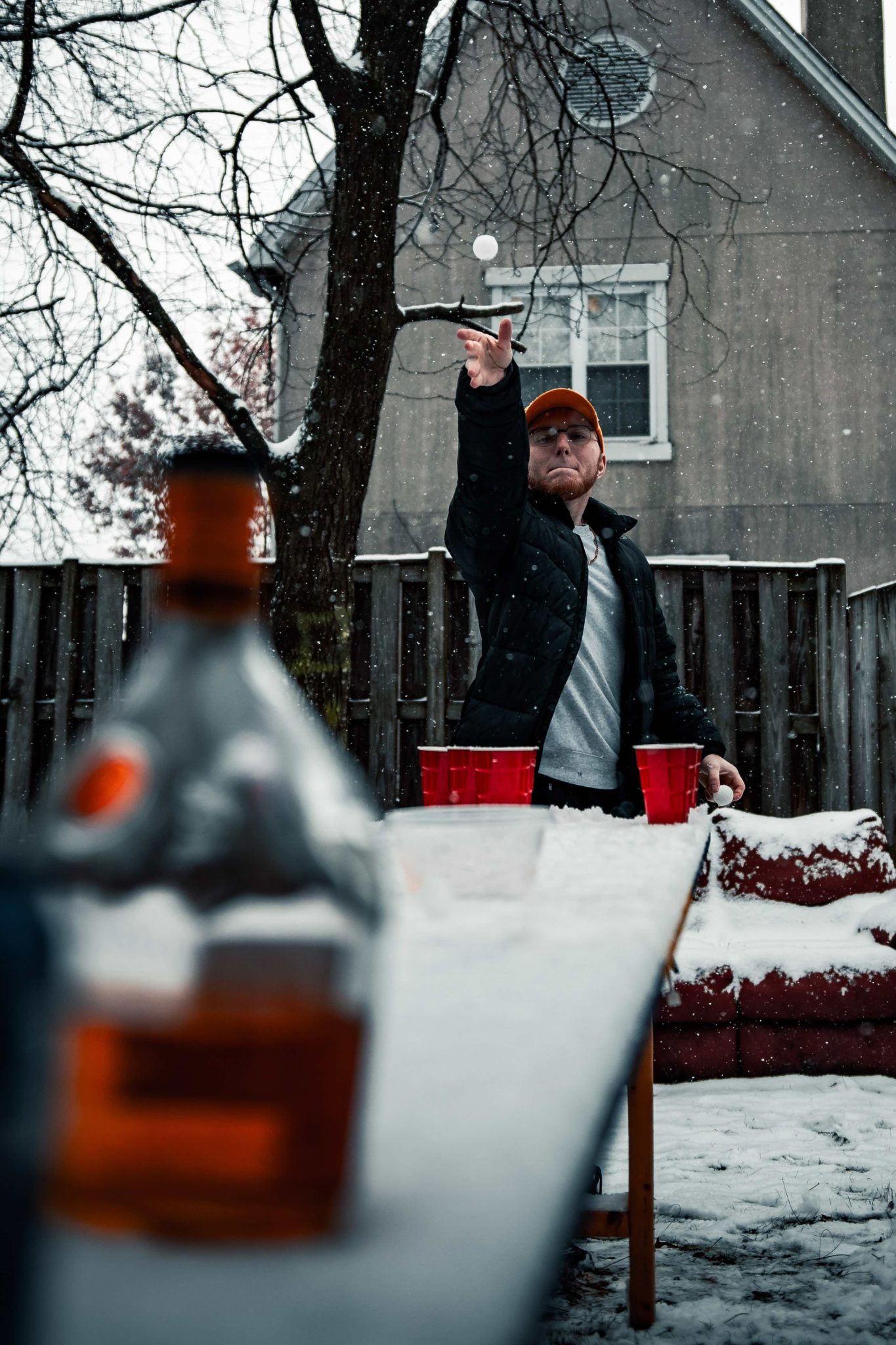Alcohol, Hazing, and College Drinking
Along with football games, dorm life, and late-night study sessions, alcohol consumption is a staple of the college experience for many people. In a national survey, 53 percent of college students consumed alcohol in the last month, and 33 percent engaged in binge drinking (defined as 4-5 drinks or more within 2 hours).
While these statistics may not surprise most people, and may even seem normal, excessive college drinking isn’t all fun and games. Thousands of deaths, fights, and sexual assaults are attributed to college drinking behaviors. One in four college students report academic difficulties related to drinking. And, particularly in schools with a strong “Greek life,” alcohol-fueled hazing rituals continue to cause serious, even fatal injuries.
Below, we’ll discuss the culture of hazing in college, the role of alcohol in campus life, and ways to manage peer pressure for students, parents, and administrators.
What Does “Hazing” Mean?

Hazing is a form of initiation in which members who wish to join an organization endure harassment, humiliation, or even abuse to become part of the group. It’s a tradition in many sororities, fraternities, and other college organizations. In fact, over 50 percent of college students involved in teams, clubs, and organizations have experienced hazing.
While college hazing rituals can involve relatively harmless forms of awkwardness or embarrassment, it’s often more serious. In 2010, ABC News reported sorority hazing had become “increasingly violent and disturbing,” The article called it “emotional blackmail” with damaging results, including reduced self-esteem, depression, and physical injury. And according to a 2015 report, every year since 1970 at least one college student in the United States has died in a hazing initiation gone wrong.
Hazing and Alcohol
Often, college hazing rituals involve alcohol—including forced drinking games and drinking large amounts in a short period of time.
A possible reason for the prevalence of alcohol in hazing rituals is that it makes dangerous behavior towards new members easier to cover up. Current members may try to use intoxication as an excuse if the initiation gets out of hand, arguing that they were drunk as well. Alcohol also impairs new members’ judgement and increases the imbalance of power. This can make them more likely to go along with risky activities.
Dangers of College Hazing Rituals
Incidents involving hazing and alcohol have repeatedly led to both deaths and arrests. In 2012, a 19-year-old was made to consume so much alcohol during a fraternity initiation that his heart stopped. Twenty-two fraternity members were later found guilty of misdemeanors. That same year, an 18-year-old died after being encouraged to drink an estimated 37 shots of hard liquor during a hazing initiation. Two members of the fraternity were sentenced to 90 days in jail.
In 2017, eight members of a Penn State fraternity were charged with involuntary manslaughter when a pledge fell down a flight of stairs and died after a night of heavy drinking. And in March 2021, a 20-year-old sophomore at Bowling Green State University died of alcohol poisoning after he and other fraternity pledges were each given a full bottle and told to finish it. His death inspired a push for increased hazing penalties in the state of Ohio.
Unfortunately, these tragic incidents are just the tip of the iceberg. In fact, of the many deaths that have happened due to hazing, 82 percent have involved alcohol. And although many colleges and states prohibit hazing, and penalize organizations found to practice these rituals, it continues to be an issue at universities across the nation.
College Life and Alcohol

Of course, peer pressure-related drinking in college isn’t limited to hazing, or to any particular type of organization. Drinking alcohol is a common behavior throughout the college years, even for students who don’t participate in Greek life. Over 80 percent of college students drink alcohol, with more than half reporting at least occasional binge drinking.
Peer Pressure and College Drinking
Research suggests there are at least three types of peer pressure that encourage drinking among college students:
- Direct peer pressure: Being offered a drink, or being pressured to drink
- Modeling: Seeing others in the same social group drinking and adopting similar behavior
- Perceived social norms: Ideas about what “normal” drinking behavior looks like among college students in general
In other words, it’s not just direct pressure that students are responding to. If heavy drinking is extremely prevalent at their college, students may feel they must participate in order to be part of the in-group.
College creates a unique environment at an unusual time in student’s lives. They are away from home for the first time, becoming independent, and coming into adulthood. This makes students more vulnerable to mirroring the behaviors they see around them in an effort to fit in and make friends.
Unfortunately, campus drinking culture can lead to injury, financial problems, legal issues, academic difficulties, sexual assault, STIs and unplanned pregnancies, and sometimes death. College students who consistently drink to excess can also develop alcohol use disorder. They may find it hard to control their drinking long after college graduation.
What Can College Students Do About Peer Pressure To Drink?
So, what can college students do to resist the pressure to drink?
If you don’t want to drink a lot in college, begin by surrounding yourself with friends who also prefer not to drink, or not to drink excessively. You can also seek out activities you enjoy outside of partying. These might include athletics, arts, volunteering in the community, hiking, and much more. Most colleges offer a huge variety of student organizations and activities, many of which don’t involve alcohol.
If you’d like to get involved in Greek life without drinking, research the fraternities and sororities at your school. You may be able to find an anti-alcohol fraternity to join, such as a sober fraternity or some Christian fraternities. There are also “dry” fraternities at most schools, but some of these organizations are dry in name only. Talk to current members or fellow students to get a better idea about the culture of drinking or partying before joining.
Of course, you can join any sorority or fraternity and still choose to limit your drinking. You’re simply more likely to encounter pressure to drink.
Tips To Control Party Drinking:
Whether or not you join a Greek organization, here are a few tips for controlling your drinking at college parties:
- Practice your “no” in advance, so you can turn a drink down with confidence in the moment
- Always carry a drink in your hand, even if it’s only soda or water, to limit drink offers
- When possible, bring along a sober or responsibly-drinking friend to help you feel more comfortable
- Have an escape plan if you end up feeling uncomfortable or overly pressured
Remember: it’s your choice whether to drink alcohol, and how much to drink. You are never obligated to drink. If the people around you make fun of you or judge you for your choices, they aren’t the sort of friends you want in your corner anyway.
What Can Parents and Administrators Do About Peer Pressure To Drink in College?

The continuing influence of parents is a major and often overlooked preventive factor in college drinking. Students who choose not to drink often do so because their parents have discussed alcohol and its negative consequences with them. While ordering college students not to drink isn’t always effective, it does help to discuss what can happen if they choose to drink excessively.
Administrators can take a variety of steps to curb harmful student drinking, including:
- Reducing the availability of alcohol on campus
- Enforcing rules about underage drinking/on-campus drinking
- Investing in education and awareness programs
- Providing behavioral interventions from health professionals
- Offering a variety of alcohol-free activities on campus
In fact, the National Institute on Alcohol Abuse and Alcoholism (NIAAA) has even developed a website dedicated to helping colleges identify the most effective tools and interventions. With the right combination of strategies, a safer campus culture around alcohol is very much possible.
Help For Controlling Your Drinking
Both during college and afterwards, many people find it difficult to control their drinking. You don’t need to identify as an alcoholic to seek support, and it’s never too early to get help. Ria’s telemedicine program can help you cut back or quit without disrupting your schedule. Best of all, we offer long-term support, so you can establish healthier patterns that stick.
Will insurance cover treatment? Verify Coverage
Have Questions? Call (800) 504-5360



